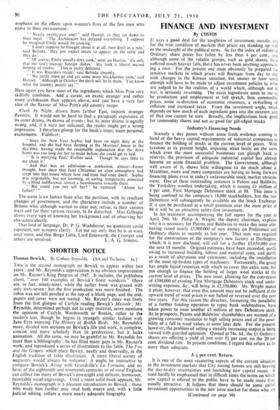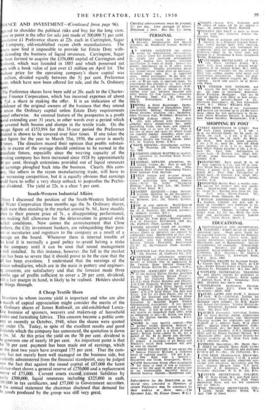FINANCE AND INVESTMENT
By CUSTOS
Ir says a good deal for the toughness of investment morale and for the trim condition of\ markets that prices are standing up well to the onslaught of the political news. So far the index of industrial Ordinary share prices has fallen by less than 4 per cent., and although some of the volatile groups, such as gold. shares, have suffered much heavier falls, there has never been anything approach- ing a rout. For the present one must obviously be prepared for sensitive markets in which prices will fluctuate from day to day with changes in the Korean situation, but sooner or later some attempt will have to be made to adjust investment policies to what are judged to be the realities of a world which, although not at war, is seriously re-arming. The main ingredients seem to me to be production and employment at full stretch, firm commodity prices, some re-direction of economic resources, a refuelling of inflation and increased taxes. From the investment angle, much depends on how much of each ingredient goes into the mixture, and of that one cannot be sure. Broadly, the implications look good for commodity shares and not so good for gilt-edged stocks.
Industry's Financing Needs Scarcely a day passes without some fresh evidence coming to hand of the heavy capital requirements of industrial companies to finance the holding of stocks at the current level of prices. With taxation at its present height, imposing strict- limits on the sums which even the most successful businesses can .plough back to reserves, the provision of adequate industrial capital has already become an acute financial problem. The Government, although well aware of it, shows little willingness to do much about it. Meantime, more and more companies are having to bring forward financing plans even in today's unfavourable stock market environ- ment. One of these outstanding instances is Patons and Baldwins, the Yorkshire woollen undertaking, which is issuing £3 million of 4 per cent. First Mortgage Debenture stock at 98. This issue is being confined to the company's 18,000 stockholders, but the new Debenture will subsequently be available on the Stock Exchange. If it can be purchased at a small premium over the issue price of 98 it will be an attractive safety-first investment.
In his statement accompanying the full report for the year to April 29th Mr. Philip A. Wright, the deputy chairman, explains why it is necessary for Patons and Baldwins to make this issue after having raised nearly £5,900,000 of new money on Preference and Ordinary shares as recently as last year. That sum was required for the construction of the company's new factory at Darlington, which, it is now disclosed, will call for a further £1,650,000 over the next 18 months. Original estimates have been exceeded, partly owing to increased building, labour and material costs, and partly as a result of- alterations and extensions, including the installation of the most up-to-date types of machinery. Fortunately, the group has ample liquid resources with which to cover this extra sum, but not enough to finance the holding of larger wool stocks at the current level of prices. The new issue, allowing for the conversion of £500,000 of existing First Mortgage Debenture stock and under- writing expenses, &c., will bring in £2,350,000. Mr. Wright makes it plain, however, that even this amount may not be sufficient if the upward trend of wool prices is not halted or reversed over the next two years. For this reason the directors, foreseeing the possibility of a further funding operation fo repay bank indebtedness, have taken power to issue another £3 million of new Debenture stock. As to prospects, Patons and Baldwins' shareholders are warned of a growing consumer resistance to high selling prices and of the possi- bility of a fall in wool values at some later date. For the present, however, the problem of selling a steadily increasing output is being viewed with guarded optimism. Quoted at 74s. 6d., the £1 Ordinary shares are offering a yield of just over 5+ per cent. on the 20 per cent. dividend rate In present conditions, I regard this return as no more than adequate.
A s per cent. Return
It is one of the most reassuring aspects of the current situation in the investment markets that City issuing houses are still braving the day-to-day uncertainties and launching new capital issues. It • need hardly be emphasised that in difficult times the terms on which new capital is offered to the public have to be made more than usually attractive. It follows that there should be some useful investment opportunities in the new issue market for those who are
(Continued on page 99) ANCE AND INVESTMENT-(Continued from page 96).
pared to shoulder the political risks and buy for the long view. case in point is the offer for sale just made of 500,000 5+ per cent. mulative £1 Preference shares at. 22s. each in Carrington, .Sagar Company, old-established rayon cloth manufacturers. The ners now find it impossible to provide for Estate Duty with- t denuding the business of liquid resources. Carrington, Sagar been formed to acquire the £356,000 capital of Carrington and whurst, which was founded in 1885 and which possessed net is with a book value of just over £1 :million on April 1st. The rchase price for the operating company's share capital was million, divided equally between the 54- per cent. Preference res, which have now been offered for sale, and the 5s. Ordinary res.
The Preference shares have been sold at 20s. each to the Charter- use Finance Corporation, which has incurred expenses of about 54d. a share in making the offer. It is an indication of the nfidence of- the original owners of the business that they intend retain the Ordinary capital unless Estate Duty requirements mpel otherwise. An unusual feature of the prospectus is a profit ord extending over 31 years, in other words over a period which s covered both booms and slumps in the textile trade. On the erage figure of £153,994 for this 31-year period the Preference idend is shown to be -covered over four times. If one takes the est figure for the year to March 31st, 1950, the cover is nearly times. The directors record their opinion that profits substan- lly in -excess of the average should continue to be earned in the mediate future, especially since the weaving capacity of the crating company has been increased since 1928 by approximately per cent. through- extensions provided out of liquid resources d earnings ploughed back into the business. Clearly this corn- ny, like others in the rayon manufacturing trade, will have to ce increasing competition, but it is equally obvious that earnings uld have to suffer a very sharp setback to jeopardise the Prefer- ce dividend. The yield at 22s. is a clear 5 per cent.
South-Western Industrial Affairs Since I discussed the position of the South-Western Industrial d Water Corporation three months ago the 5s. Ordinary shares, ich were then standing in the market around 9s. 9d., have steadily lien to their present price of 7s , a disappointing performance, en making full allowance for the deterioration in general stock arket conditions. Now comes the announcement that Close others, the .City investment bankers, are relinquishing their posi- n as secretaries and registrars to the company as a result of a avage on the board. Whenever there is internal trouble of is kind it is normally a good , policy to-avoid ha'ving a stake the company until it can be seen 'that sound management well installed. In this instance, however, the fall in the market ice has been so severe that it should prove to be the case that the 11 has been overdone. I understand that the earnings of the rious subsidiaries, which are in the main in pottery and engineer- g concerns, are satisfactory and that the forecast made three onths ago of profits sufficient to cover a 20 per cent. dividend, ith a fair margin in hand, is likely to be realised. Holders should e things through.
- A Cheap Textile Share Investors to whom income yield is important and who are also search of capital appreciation might consider the merits of the Ordinary shares of James Rothwell, an old-established Lanca- ire business of spinners, weavers and makerk-up of household xtiles and furnishing fabrics. This concern became a public corn- ny as recently as October, 1948, when the shares were quoted .st under 17s. Today, in spite of the excellent results and good vidends which the company has announced, the quotation is down 14s. 3d. At this price the yield on the 70 per cent. dividend is e generous one of nearly 10 per cent. An important point is that his 70 per cent payment has been made out of earnings, which or the past two years have averaged 175 per cent. That the com- lanY has not merely been well managed on the business side, but prudently administered from the financial standpoint, may be judged rom the fact that against the issued capital of £87,000 the latest alance-sheet shows a general reserve of £270,000 and a replacement eserve of 175,000. Current assets exceed'surrent liabilities by early £500,000, liquid resources including i325,000 in cash, 100,000 in tax certificates, and £57,000 in Government securities. n his annual statement the chairman disclosed that demand for he goods produced by the group was still Ivry great.



































 Previous page
Previous page